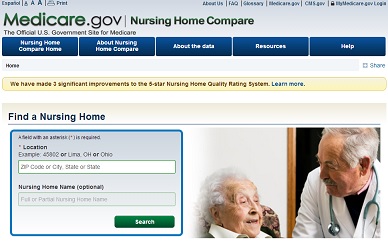Government Raises the Bar on Nursing Home Ratings
Published: Fri, 02/20/15
|
|
Government Raises the Bar on Nursing Home RatingsIf you cannot view the image below, please read the article on our blog. Nursing Home Compare Website
Q. My father has dementia and will need skilled nursing care in the near future. There are so many nursing homes in this area to consider, and I have heard differing opinions from friends and family. How can we really know which one is best, and how can we afford it?
A. When seniors and their families plan ahead, they can make multiple visits to facilities to find the one that best meets their needs, and arm yourself with my Nursing Home Evaluation Tool. However, if you have no choice and need a nursing home for a loved one right away, there are other tools you can use to assist in your search, including the federal government's online tool, Nursing Home Compare.
Nursing Home Compare is a great starting point for consumers, as it offers star ratings for all nursing homes that participate in Medicare (for short-term rehabilitation) or Medicaid (for long-term care). The ratings are based on the facility's performance on health inspections, staffing hours for nurses and nursing assistants, and quality measures, such as the prevalence of pressure ulcers and falls among residents.
In recent news, the federal government is increasing its scrutiny and raising the bar on an array of quality measures, requiring nursing homes to do more to get high scores on Nursing Home Compare. In the past, the grades -- in the form of one- to five-star ratings -- relied heavily on self-reported data, allowing a majority of homes to score high ratings. (55% of the nation's nursing homes had overall scores of either four or five stars on Nursing Home Compare in January.) The system has come under recent criticism because some highly rated nursing homes have had numerous problems and face fines and other enforcement actions, which led to these modifications being made.
What measures will be more scrutinized in the new quality rating system?
The changes follow others announced in October that require additional verification of self-reported staffing levels and other attempts to confirm quality data submitted by the homes. With the changes being enforced, many homes could drop a star or more from their current levels, even though nothing may have changed, officials from the Centers for Medicare and Medicaid Services said.
According to CMS, no rating system can address all of the important considerations that go into a decision about which nursing home may be best for a particular person. It is important to take into account the extent to which specialty care is provided (such as specialized rehabilitation or dementia care) and how easy it will be for family members to visit the nursing home resident. CMS suggests that consumers should use the Nursing Home Compare Web site together with other sources of information for the nursing homes (including a visit to the nursing home) and State or local organizations (such as local advocacy groups and the State Ombudsman program).
How else can you tell if a nursing home is a good fit? As CMS states, ratings are helpful, but do not tell the full story. Before committing to a nursing home for your father, be sure to take a tour during regular business hours, have a meal, pay attention to smells, sounds, and temperature, and observe whether residents are engaging in activities or sitting around listlessly. For more suggestions, please read our recent blog post entitled "Finding the Right Nursing Home."
Medicaid Asset Protection
Nursing homes in Northern Virginia cost $10,000-12,000 a month, so affordability is a tremendous concern. To protect your family's hard-earned assets from these catastrophic costs, the best time for your father to create his long-term care strategy is NOW. It is never too late to plan in connection with nursing home long-term care, also called Lifecare Planning and Medicaid Asset Protection Planning. Please call us at 703-691-1888 in Fairfax, 540-479-1435 in Fredericksburg, 301- 519-8041 in Rockville, MD, or 202-587-2797 in Washington, DC to make an appointment for a no-cost consultation. ---
Critter Corner: Meditation has Many Benefits for Seniors Dear Commander Bun Bun,
My neighbor, Shirley, meditates every day. She says it helps with several aspects of her health, including retaining memories. Do you know anything about this?
Anita Relax
---
Dear Anita,
Meditation has been scientifically proven in many studies to be an effective tool for mental, physical, and emotional senior health. In fact, many experts refer to meditation as the "fountain of youth" for seniors, who can receive a limitless number of benefits, including:
Meditation (specifically transcendental meditation) can also reduce health care costs, as it enhances inner peace and wellness. In fact, according to a study published in the American Journal of Health Promotion, people with consistently high healthcare costs experienced a 28% cumulative decrease in physician fees after an average five-year period practicing the Transcendental Meditation technique. Transcendental meditation is a simple, natural technique. In transcendental meditation, you silently repeat a personally assigned mantra, such as a word, sound or phrase, in a specific way. This form of meditation allows your body to settle into a state of profound rest and relaxation and your mind to achieve a state of inner peace, without needing to use concentration or effort. Another study recently conducted by the University of California, Los Angeles, showed that long-term meditators experienced less gray matter loss compared with matched control persons who did not meditate. In other words, meditation actually slows the aging of the brain. Read more about this study in Medscape.
Also, please check out this Huffington Post slide show for seven amazing facts about meditation.
Hop this is helpful!
Commander Bun Bun
|
| |||||||
|
This email was sent to
. |








